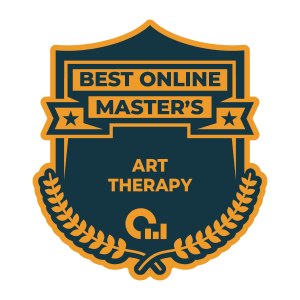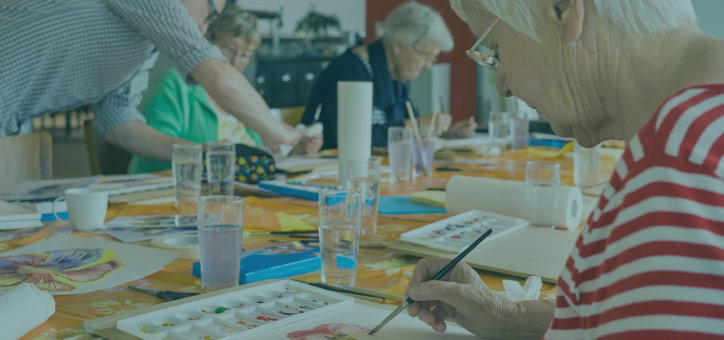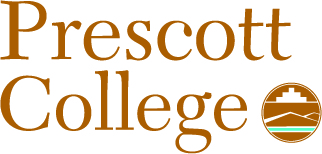Expand your artistic prowess into the world of therapy by earning an online masters degree in art therapy.

Do you love helping others? Have you always been artistically talented or had an interest in art history? Or maybe you are a medical professional who’s interested in exploring the therapeutic treatment of mental and physical health issues by focusing on artistic expression. If so, the following master of art therapy online programs can help train you for the unique challenges in today’s mental health field.
Consult the information below to see if an online master’s degree in art therapy is the right way for you to mix your professional and creative goals.
What is an Online Master’s Degree in Art Therapy?
An online master’s degree program in art therapy aims to prepare its graduates to work with a wide array of individuals who seek to improve and expand their mental and physical health. As a student in an online masters in art therapy, you will combine art and expression with science and psychology to improve the lives of others.
These programs can customize the tools and experiences of health care professionals and existing therapists to concentrate on treatment through artistic expression.
Every art therapy online masters is a little bit different, but generally speaking, you can expect to take online courses, perhaps in a cohort of students (so you have the same classmates throughout the program). Additionally, many masters of art therapy online programs include a practicum or internship experience, if not both.
A practicum experience usually involves more observation and less active participation on your part. For example, you might shadow an art therapist and observe how they work with various clients. An internship, on the other hand, gives you an opportunity to be an active part of the art therapy process. Under the supervision of an experienced art therapist, you might work with:
- individuals
- couples
- families
- groups of clients
Think of the internship as a “trial run” during which you can test out what you’ve learned while being guided and directed by your supervisor.
Since we’re discussing online programs, it’s important to note that practicum and internship requirements allow you to work in or near your community to minimize the amount of travel. Art therapy master’s programs online do a fine job of accommodating students’ wishes for placements.
In some programs, you’ll have the chance to select a specialization area as part of your art therapy education. For example, you might specialize in school counseling or marriage and family therapy. What’s more, many online masters art therapy programs include certificate programs that allow you to expand your learning even further.
Though the number and type of certificates available to you depends on the school you attend, you might find options such as:
- Grief Therapy
- Abuse and Recovery Therapy
- Children’s Mental Health
- Addiction Therapy
- Neurobiology
Additionally, your online degree with an art therapy concentration might include classes in:
- Interventions
- Well-being
- Social justice
- Fine arts
- Clinical mental health counseling
These and other courses help you devise treatment plans for a wide range of clients, from adolescents to people with a substance abuse issue to terminal cancer patients. You can combine your knowledge of the creative process with art therapy and counseling to address many different life issues for many different clients.
Every art therapy degree online is different, so the experience you have depends on the specific program you choose. For example, Master of Arts programs focus more on the practical application of the knowledge and skills that you develop. Master of Science programs, on the other hand, tend to focus more on research. Furthermore, you might enroll in a Master of Arts in Counseling program that has a concentration in art therapy or a Master of Arts in Expressive Art Therapy. These programs will have different requirements because of their focus areas.
Once admitted to a program, you’ll undertake coursework in psychological development, art therapy assessment, and psychodiagnostics. Additional courses might include:
- research methods
- group therapy
- multicultural diversity competence
Students who graduate with their master’s degree in creative arts therapy can pursue further national credentialing or licensure, perhaps as a registered art therapist (or ATR-BC, which is a board certified registered art therapist). Those options differ by state, so be sure to investigate licensing in the state in which you will practice.
All told, you can expect to spend about two or three years of full-time study in your online master’s in art therapy program. Depending on the higher education program, you’ll need to complete anywhere from 30-60 semester credits of coursework, practicum, and internship hours.
See Also: Art History Degree Online: 10 Best Degrees
What are the Admissions Requirements For an Online Master’s Degree in Art Therapy?
Getting an online art therapy masters typically requires that you already have a four-year bachelor’s degree in a related field first. Usually, this means having a degree in:
- psychology
- social work
- closely related field
Since the focus of an art therapy counseling program is on using art as a therapeutic vessel, it’s important that you already have a working knowledge of human services techniques.
If you don’t have an undergraduate degree in psychology or social work, but have a degree in art, visual arts, studio art, or a related field, you might have to take prerequisite courses to get up to speed. For example, you might need to take several psychology or social work courses to build foundational knowledge about:
- mental health
- therapy techniques
- psychological theories
Furthermore, some graduate level programs in art therapy and counseling require that you:
- Have a satisfactory undergraduate GPA
- Submit satisfactory GRE scores
- Submit a personal statement or essay
- Letters of recommendation
In some cases, you might also need to participate in an interview with one or more faculty members. For online programs, these interviews are often done via videoconference.
Who Accredits Art Therapy Programs and Provides Credentialing?
Enrollment in an accredited art therapy master’s program is extremely important. Accreditation ensures that the program is properly designed and that the training you get prepares you well for the world of work. Additionally, licensure as an art therapist often requires that you graduate from an accredited program.
There are several organizations that accredit art therapy programs and oversee credentialing in this field, including:
- Commission on Accreditation of Allied Health Education Programs (CAAHEP)
- American Art Therapy Association (AATA)
- Art Therapy Credentials Board (ATCB)
- Council for Accreditation of Counseling and Related Educational Programs (CACREP)
Before you commit to any program, throughly investigate if the program is accredited (and by which organization). Also ensure that the program aligns with credentialing standards by one of the organizations listed above.
How Much Can You Earn With an Online Master’s Degree in Art Therapy?
A master’s degree in art therapy can be applied to a variety of treatment environments, so earnings vary. For example, work as a rehabilitation counselor, a family therapist, or even a specialty psychologist that concentrates on art therapy techniques would utilize a master’s in art therapy degree.
According to the U.S. Bureau of Labor Statistics (BLS), rehabilitation counselors make a median salary of $38,560 per year despite having a master’s degree with practical experience hours. Marriage and family therapists, on the other hand, earn a median salary of $49,880 per year and specialty psychologists earned the most with a median yearly wage of $81,040.
Again, there are many factors at play when it comes to the salary you might earn with a masters in art therapy online. For example, as a brand-new graduate, you’re likely to earn less money than an experienced professional counselor because your level of experience is directly related to how much money you can make. Likewise, your level of education and training strongly affects your income. By pursuing a master’s degree, you’re giving yourself the opportunity to earn additional income. If you pursue certifications and post-master’s training, you’ll improve your chances of earning a higher income even more.
The industry in which you work affects your earnings, too. Here’s a prime example: marriage and family therapists that work for state governments make around $77,960 per year. But the same type of therapist that works for family services organizations make less than $50,000 per year. That’s a significant difference!
Even the geographic location in which you work can affect your income. Psychologists in general earn more in locations like:
- Sacramento, California
- San Francisco, California
- Eugene, Oregon
The average wages earned by psychologists in these cities is in excess of $125,000.
See Also: How to Start a Health and Wellness Business
What are the Best Masters Art Therapy Online Programs?
OSR uses six data points to rank the best art therapy masters online programs. There are three school-wide and three program-specific criteria.
For school-wide, OSR uses student satisfaction, admission rates, and the number of programs the school offers online. For program-specific, OSR checks the median debt of graduates from that program, how many degrees are offered within that program’s umbrella department, and what percentage of students at that school graduated from that department.
The six statistics are displayed by each school. The sliding bar under each statistic represents how that school compares to other US institutions. “Not reported” means a school did not release that information to the US Department of Education. A more detailed description of the OSR process can be found on the methodology page.
Let’s take a look at some of the best online art therapy programs available today.










